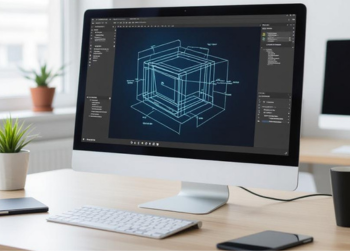Design & Digitization Services for construction represent a transformative approach to modern construction project planning, execution, and management. By integrating advanced design methodologies with cutting-edge digital technologies, these services enable construction professionals to create precise, efficient, and collaborative project workflows. From conceptual design to project completion, they enhance accuracy, reduce costs, and improve communication across all stakeholders, including architects, engineers, contractors, and clients.
Design Services in Construction
Design services form the creative and technical backbone of construction projects. These services encompass the development of architectural plans, structural designs, and engineering schematics tailored to meet project specifications and regulatory requirements. Key components include:
- Architectural Design: Creating detailed blueprints and 3D renderings that visualize the aesthetic and functional aspects of buildings. These designs ensure compliance with zoning laws, building codes, and client expectations.
- Structural and MEP Design: Developing plans for structural integrity (e.g., foundations, beams, columns) and mechanical, electrical, and plumbing (MEP) systems to ensure safety, efficiency, and sustainability.
- 3D Modeling and Visualization: Utilizing tools like AutoCAD, Revit, or SketchUp to produce three-dimensional models that allow stakeholders to explore designs, identify potential issues, and make informed decisions before construction begins.
- Sustainable Design: Incorporating energy-efficient materials, renewable energy systems, and green building standards (e.g., LEED certification) to minimize environmental impact and operational costs.
These design services lay the groundwork for accurate construction estimations and material takeoffs, ensuring that projects are both feasible and aligned with the client’s vision.
Digitization Services in Construction
Digitization services revolutionize traditional construction processes by converting physical plans, measurements, and data into digital formats that enhance precision, accessibility, and collaboration. These services leverage advanced technologies to streamline workflows and reduce inefficiencies. Key digitization services include:
- Building Information Modeling (BIM): BIM is a cornerstone of construction digitization, creating intelligent 3D models that integrate architectural, structural, and MEP data. BIM enables real-time collaboration, clash detection (identifying conflicts between systems), and lifecycle management from design to maintenance.
- Plan Digitization: Converting paper-based blueprints, sketches, or legacy drawings into digital formats (e.g., CAD files) for easier storage, editing, and sharing. This ensures older projects can be seamlessly integrated into modern workflows.
- 3D Scanning and Surveying: Using laser scanning (LiDAR) or photogrammetry to capture accurate measurements of existing structures, sites, or terrain. These digital models support renovations, retrofits, or site preparation with precise data.
- Quantity Takeoffs and Estimations: Digitizing material takeoffs by extracting quantities from digital plans, reducing manual errors, and enabling faster, more accurate cost estimations.
- Construction Management Software Integration: Implementing tools like Procore, PlanGrid, or Bluebeam to digitize project documentation, schedules, and progress tracking, improving transparency and coordination among teams.
Benefits of Design & Digitization Services
The integration of design and digitization services in construction offers numerous advantages:
- Enhanced Accuracy: Digital tools minimize human error in measurements, calculations, and designs, leading to fewer costly mistakes during construction.
- Improved Collaboration: Cloud-based platforms and BIM allow real-time data sharing among architects, engineers, contractors, and clients, fostering better decision-making and reducing miscommunication.
- Cost and Time Efficiency: Automated takeoffs, precise designs, and streamlined workflows reduce material waste, labor costs, and project delays.
- Visualization and Risk Mitigation: 3D models and simulations help identify design flaws or construction challenges early, preventing expensive rework.
- Sustainability and Compliance: Digital tools enable the integration of eco-friendly materials and adherence to regulatory standards, ensuring environmentally responsible and legally compliant projects.
- Data-Driven Insights: Digitized data supports analytics for cost forecasting, resource allocation, and project performance tracking, enhancing overall project management.
Applications in Construction
Design & Digitization Services are critical across various construction sectors, including:
- Residential Construction: Creating detailed home designs and digitized plans for efficient building and customization.
- Commercial Projects: Supporting large-scale developments like offices, retail spaces, or hotels with complex structural and MEP requirements.
- Infrastructure: Designing and digitizing plans for roads, bridges, and utilities, ensuring precision in large-scale public works.
- Renovations and Restorations: Using 3D scanning to digitize existing structures for accurate retrofitting or heritage preservation.
- Industrial Construction: Developing precise designs for factories, warehouses, or plants with integrated automation systems.
Industry Impact
By adopting Design & Digitization Services, construction firms can stay competitive in an industry increasingly driven by technology. These services enable faster project delivery, reduced costs, and higher-quality outcomes, meeting the demands of modern clients and complex projects. They also align with the growing trend toward smart construction, where IoT, AI, and data analytics further enhance project efficiency and innovation.
In conclusion, Design & Digitization Services for construction are essential for transforming traditional processes into modern, technology-driven workflows. By combining creative design with digital precision, these services empower construction professionals to deliver projects that are accurate, sustainable, and cost-effective, ultimately shaping the future of the built environment.

